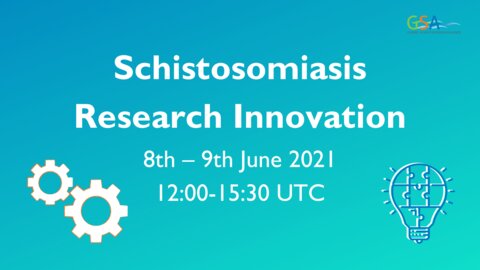Meeting | Schistosomiasis Research Innovation 2021

The Global Schistosomiasis Alliance is organising a free Schistosomiasis research-focused online meeting, highlighting some exciting research findings and research in progress from scientists across the globe.
On the first day participants will hear brief updates from the GSA working groups and work streams, and from innovative schistosomiasis research on tools for morbidity assessment, vaccine development in endemic countries, geostatistical models for informing survey designs, biocontrol tools, genomics and more.
The second day will be focused on early-career researchers and exciting research-in-progress with interactive networking opportunities for participants. Talks will include chlorination methods for schistosomiasis prevention, the impact of schistosomiasis treatment on vaccine responses, identifying UHC gaps, schistosome diagnostic developments and more.
Join us on the 8th & 9th of June to explore what's happing in schistosomiasis research.
Meeting Agenda
Day 1 - 8 June 2021 12:00-15:30 UTC
*please note the meeting agenda is subject to change
|
|
Theme |
Presenter(s) |
|
12:00 |
Welcome, intro and house keeping |
David Rollinson |
|
Session 1 GSA working group and workstream brief updates Moderator: David Rollinson and Anouk Gouvras |
||
|
12:10-12:15 |
Research Snails Genital Schistosomiasis COP |
Poppy Lamberton/Justin Nono Komguep Nic Wheeler/Fiona Allan Anouk |
|
12:15-12:20 |
Monitoring and Evaluation |
Fiona Fleming/Louis-Albert Tchuem-Tchuente |
|
12:20-12:25 |
Engineering |
Mike Templeton |
|
12:25-12:30 |
Behaviour Change and Health Education |
Willemijn Zaadnoordijk |
|
12:30-12:35 |
Implementation Elimination PZQ Coordination |
Anna Phillips/Upendo Mwingira |
|
12:35-12:40 |
Diagnostics |
Bonnie Webster/Lisette van Lieshout |
|
12:40-12:50 |
Discussion |
|
|
12:50-13:05 |
Break |
|
|
Session 2 Research Findings & Innovative Research Moderator: Poppy Lamberton/Justin Komguep and Anouk Gouvras |
||
|
13:05-13:20 |
Morbidity / Innovative Tool |
Maurice Odiere Neglected Tropical Diseases Unit, Centre for Global Health Research, Kenya Medical Research Institute (KEMRI) |
|
13:20-13:35 |
Vaccines Immunological Considerations for Schistosoma Vaccine Development: Transitioning to Endemic Settings |
Emmanuella Driciru Immunomodulation and Vaccines Programme, Medical Research Council/Uganda Virus Research Institute and London School of Hygiene & Tropical Medicine Uganda Research Unit, Entebbe, Uganda. |
|
13:35-13:50 |
Modelling Using a geostatistical approach to determine spatial structure of S. mansoni following 5 rounds of preventive chemotherapy and informing an efficient survey design for national re-mapping and impact assessment |
Markos Sleshi, Ethiopian public health institute (EPHI), Federal Ministry ofHealth, Addis Ababa, Ethiopia. |
|
13:50-14:05 |
Biocontrol A rotifer-derived paralytic compound prevents transmission of schistosomiasis to a mammalian host |
Phil Newmark, Howard Hughes Medical Institute, Morgridge Institute for Research, University of Wisconsin-Madison, USA |
|
14:05-14:15 |
Break |
|
|
14:15-14:30 |
Genomes/Genomics |
Jonathan Shortt, Department of Biochemistry and Molecular Genetics / Colorado Center for Personalized Medicine, University of Colorado Anschutz Medical Campus, USA |
|
14:30-14:45 |
Snails & modelling: |
Roseli Tuan, Molecular biology of vectors and parasites, Superintendência de Controle de Endemias- SUCEN, Secretaria of Health São Paulo, Brazil |
|
14:45-15:00 |
Human Immunology |
Derick Osakunor, Childrens Research Institute, Childrens National Medical Center, Washington DC, USA |
|
15:00-15:15 |
Risk mapping/Surveillance Tool |
Jing-Bo Xue, National Institute of Parasitic Diseases, Chinese Center for Diseases Control and Prevention, Chinese Center for Tropical Diseases Research, China |
|
15:15-15:20 |
Closing remarks |
|
Day 2 - 9 June 2021 12:00-15:30 UTC
*please note the meeting agenda is subject to change
|
|
Theme |
Presenter(s) |
||
|
12:00-12:10 |
Welcome, intro and house keeping |
David Rollinson |
||
|
Session 4 Early Career Research Moderator: Poppy Lamberton/Justin Komguep and Anouk Gouvras |
||||
|
12:10-12:25 |
Immunity & vaccines: Effect of intensive treatment for schistosomiasis on vaccine responses among rural Ugandan adolescents: trial protocol, updates. |
Gyaviira Nkurunungi, MRC/UVRI and LSHTM Uganda Research Unit, Entebbe, Uganda |
||
|
12:25-12:40 |
Laura Braun, Imperial College London, UK |
|||
|
12:40-12:55 |
Diagnostics: Towards accurate schistosomiasis serology using a glycan microarray approach. |
Dr. Anna Kildemoes, Department of Parasitology, Leiden University Medical Center (LUMC), Netherlands |
||
|
12:55-13:10 |
Social Science and equity: Achieving equity in UHC interventions: who is left behind by neglected tropical disease programmes in Cameroon? |
Christine Masong, Department of Social Sciences and Management, Catholic University of Central Africa, Yaoundé, Cameroon |
||
|
13:10 – 13:20 |
Break |
|
||
|
Session 5 Developing careers in schistosomiasis research – Networking session |
||||
|
13:20 -13:25 |
Effectiveness of ultraviolet disinfection as a water treatment to inactivate cercariae |
Lucinda Hazell, Imperial College London, UK |
||
|
TBC |
||||
|
14:15-15:00 |
Networking Opportunities on AirMeet including research-themed networking rooms for the early-career rapid-fire presenters to discuss their research and opportunities for socialising in “Social Rooms” |
|||